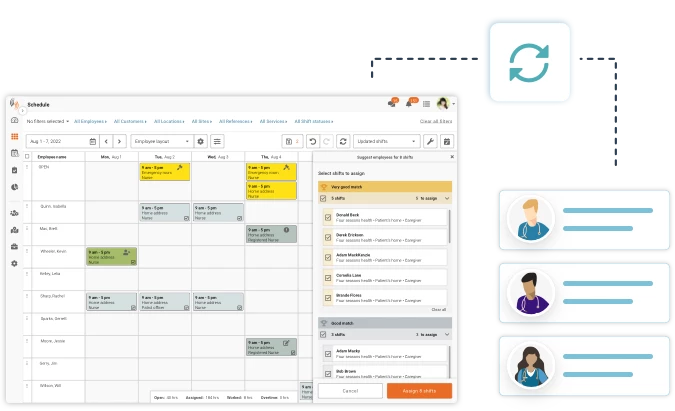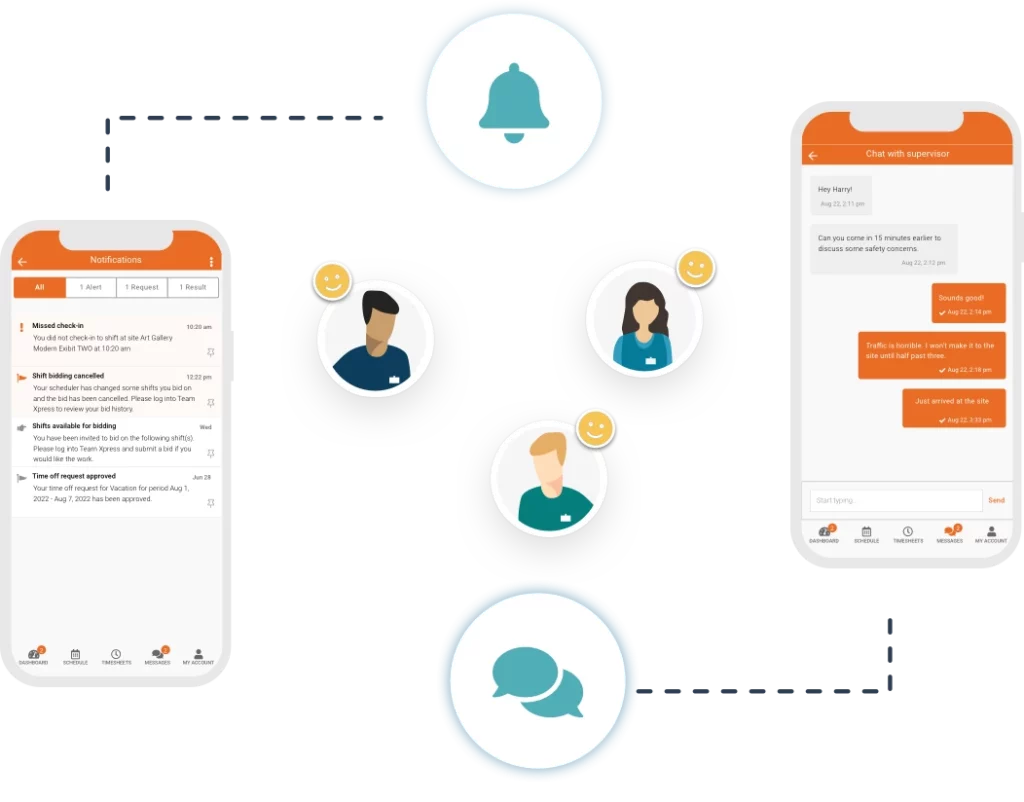Shift planning is an essential facet of many businesses across multiple sectors. Regardless of the industry, from healthcare to hospitality, a well-executed shift schedule is paramount to ensure smooth operation and employee satisfaction.
However, even with its importance, many businesses still struggle with the complexities and nuances of effective shift planning. Lets tak a look at what the process involves, how it can impact your organization, and how you can tackle it like a pro!
Understanding Shift Planning

Shift planning is a method of scheduling employees’ work hours across a week or month. This planning accounts for variations in business needs, ensuring that enough staff are on hand to meet demand without being overstaffed, which could lead to unnecessary costs.
Effective employee scheduling takes into account several factors. These include the individual availability of employees, balancing their work-life commitments, addressing peak business hours, and considering statutory employment rights such as required breaks and maximum working hours.
The Impact of Poor Shift Planning
When shift planning is not handled appropriately, the repercussions can negatively impact an organisation on several fronts.
Operational Disruption
Without proper shift planning, you risk having either too few or too many staff members during different periods. Understaffing may lead to stress and burnout, errors, and decreased customer satisfaction due to slow service. On the other hand, overstaffing results in unnecessary payroll costs.
Employee Dissatisfaction and Turnover
Ineffective shift planning can lead to dissatisfaction among employees. Unpredictable or erratic schedules, lack of work-life balance, and frequent last-minute changes can lead to stress and job dissatisfaction. This can then lead to increased employee turnover, which brings its own costs in terms of recruitment and training. In fact, workers subjected to three or more “just-in-time” scheduling practices experience a turnover rate that is 50% higher compared to those who aren’t exposed to any such scheduling methods.
Compliance Issues

Failure to consider employment regulations in your schedule can result in non-compliance issues, potential fines, and damage to your organisation’s reputation. This is often the case where workers are part of a union. Schedulers have to consider rest periods between shifts, maximum working hours and even seniority when assigning shifts. All of this can be a challenge to follow when planning shifts manually.
The Role of Technology in Shift Planning
To counteract the potential pitfalls of poor shift planning, businesses can leverage technology. Of course, the obvious solution is employee scheduling software, which can automate and streamline the process.
Celayix, for example, consider employees’ availabilities, skills, and contract terms while also factoring in business rules and fluctuations in demand. This results in an optimally balanced and compliant shift plan. Our software also provides autonomous scheduling options such as self scheduling and shift bidding. This can enhance employee sense of control and satisfaction.
One of the more recent developments in scheduling technology is the use of Artificial Intelligence. AI can truly take your shift planning to the next level. Celayix AI looks at your historical scheduling data to understand your decisions and improve your schedule where possible. It recognises patterns such as having particular employees in certain locations/roles on set days, or having caregivers work with certain patients. This type of insight could never be achieved manually in such speed.
Furthermore, Celayix gives schedulers advanced reporting capabilities, providing insights into your scheduling efficiency, identifying trends, and offering opportunities for improvement.
Shift Planning Best Practices
So, how can we use these tools and the principles of effective shift planning to benefit the organisation and the employees? Here are some best practices.
Prioritize Communication

Communicate with your staff regularly. Understand their availability and any changes to it. Keep them informed about the shift planning process, and let them know in advance about their schedules. If changes need to be made, ensure they are communicated promptly. This is a prime example of how software can be used to improve processes. Not only does Celayix allow employees to input their availability which is considered during shift allocation… but it also sends out notifications to employees via the mobile app whenever a schedule change affects them directly.
Be Fair and Consistent
Aim to distribute shifts fairly among your staff. This doesn’t necessarily mean everyone works the same hours, but they should feel that the scheduling process is equitable. Consistency in shift patterns can also contribute to work-life balance and job satisfaction. Again, scheduling software like Celayix can help with this. Features like our AI or Autofill remove scheduler bias which can often occur subconsciously when planning shifts.
Encourage Shift Swaps (Within Reason)
Allowing employees to swap shifts among themselves can provide more flexibility and autonomy. However, it’s important to have policies in place to avoid chaos and ensure that the needs of the business are still met. Learn how to create an effective shift swapping policy here.
Use Employee Scheduling Software
As mentioned earlier, employee scheduling software can significantly enhance your shift planning processes. Choose a system that fits your business needs, size, and budget, and take full advantage of its features to automate and optimize your schedule. If you’d like to learn about Celayix and if we’re a fit for you, check out a free live demo here!

Consider Training and Skills
Ensure that every shift has the right mix of skills to meet the tasks at hand. This might mean considering the abilities of individual staff members and ensuring a balanced team for each shift. This is another element of shift planing that can be difficult to manage manually. With the right software, you can store employee skills and qualifications to ensure that the right people are in the right place at the right time.
Factor in Breaks and Compliance
Ensure that your shift planning adheres to labor laws regarding working hours, overtime, and mandated breaks. Compliance should always be a priority to avoid potential legal issues.
Be Prepared for Unexpected Changes
Despite the best plans, things can go wrong. A staff member might fall ill or an unexpected surge in demand might occur. Be ready to make quick adjustments to your shift plan when necessary. With Celayix, you can use the Find Replacement feature which will provide a list of available and qualified staff to replace sick or absent employees. Rather than manually going down through a list and calling each one, simply send out a batch notification and wait for an employee too accept the shift!
“Celayix has helped me save 30% of my time and allows me to get ahead by creating weekly schedules many weeks in advance using saved templates. In addition, the capability to make batch changes is easy and helps reduce errors.”
CHRISTOPHER MOTELY, SECURITY MANAGER, MOMA, NY
Effective shift planning can be a challenge, but with the right approach and tools, it can be a manageable and even beneficial process. Understanding the impacts of poor scheduling can motivate businesses to improve their current practices. By integrating technology, like employee scheduling software, businesses can ensure that they have an efficient, fair, and compliant shift plan that meets the needs of both the organisation and its employees.
It’s not just about filling slots in a schedule. It’s about optimizing resources, promoting work-life balance, and ultimately driving the success of your business. With these tips and strategies in mind, you can master shift planning like a pro. If you want to try out Celayix for free, sign up for a free trial today.





